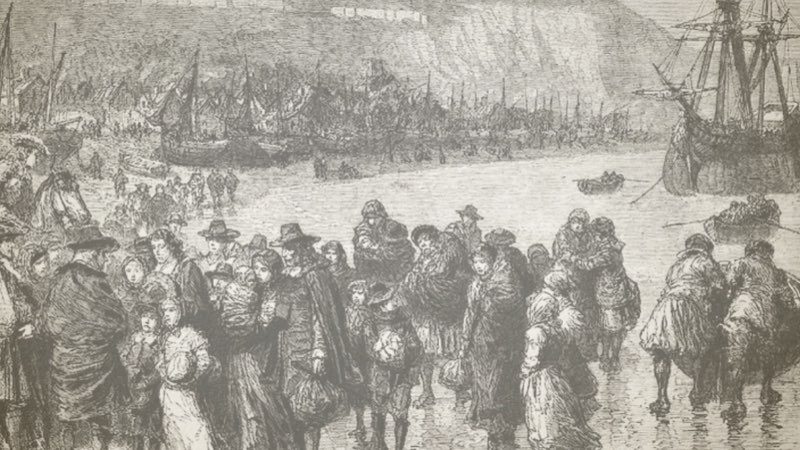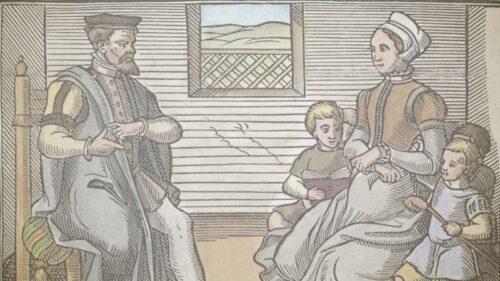
Original Preface
In bringing before the public this history of a private family, part of which was published some years ago, we feel it to be possible, that in our own admiration of the virtues of our forefathers, and our deep interest in the vicissitudes of their fortunes, we may over-estimate the pleasure a perusal is likely to afford the general reader. There are, however, so many individuals in the United States who are lineally descended from James Fontaine, that we think the publication is required for them alone. We believe, also, that the work will address itself to the hearts of a numerous body of Christians, who glory, like ourselves, in a Huguenot origin, and who, in reading the following pages, may realize, more fully than they have hitherto done, the trials of their own ancestors in leaving the homes of their fathers for the sake of the Gospel, and be thereby incited to more steadfast faith.
We have been so much struck with some remarks upon the benefits to be derived from family history in a preface to the “Lives of the Lindsays,” that we venture to make a quotation which we think equally applicable to the volume we are now introducing to the reader.
“Every family should have a record of its own. Each has its peculiar spirit, running through the whole line, and, in more or less development, perceptible in every generation. Rightly viewed, as a most powerful but much neglected instrument of education, I can imagine no study more rife with pleasure and instruction. Nor need our ancestors have been Scipios or Fabii to interest us in their fortunes. We do not love our kindred for their glory or their genius, but for their domestic affections and private virtues, that, unobserved by the world, expand in confidence towards ourselves,and often root themselves, like the banian of the East, and flourish with independent vigor in the heart to which a kind Providence has guided them. An affectionate regard to their memory is natural to the heart; it is an emotion totally distinct from pride,—an ideal love, free from that consciousness of requited affection and reciprocal esteem, which constitutes so much of the satisfaction we derive from the love of the living. They are denied, it is true, to our personal acquaintance, but the light they shed during their lives survives within their tombs, and will reward our search if we explore them . Be their light, then, our beacon—not the glaring light of heroism which emblazons their names in the page of history with a lustre as cold, though as dazzling, as the gold of an heraldic illuminator; but the pure and sacred flame that descends from heaven on the altar of a Christian a heart, and that warmed their naturally frozen affections, till they produced the fruits of piety, purity, and love-evinced in holy thoughts and good actions, of which many a record might be found in the annals of the past, would we but search for them, and in which we may find as strong incentives to virtuous emulation as we gather every day from those bright examples of living worth, which it is the study of every good man to imitate. And if the virtues of strangers be so attractive to us, how infinitely more so should be those of our own kindred, and with what additional energy should the precepts of our parents influence us, when we trace the transmission of those precepts from father to son through successive generations, each bearing the testimony of a virtuous, useful and honorable life to their truth and influence, and all uniting in a kind and earnest exhortation to their descendants so to live on earth, that followers of Him through whose grace alone we have power to obey Him—we may at last be reunited with those who have been before, and those who shall come after us—
“No wanderer lost,
A family in heaven.”
Be grateful, then, for your descent from religious, as well as noble ancestors; it is your duty to be so, and this is the only worthy tribute you can now pay their ashes.”
On the former appearance of a portion of the present book, many supposed it to be a work of imagination merely, presented under the guise of autobiography. It is therefore proper, now, to state that it is in truth what, on the title-page, it purports to be, an authentic narrative of actual occurrences, and is drawn entirely from family manuscripts.
We have translated and printed in an Appendix various documents and edicts throwing light upon the history of the times, some of which, we believe, have not been published at length in the English language for more than a century. We took infinite pains, without success, to procure a translation of the Edict of Nantes, and were therefore induced to translate it for ourselves, and we think it desirable to place it within the general reach of the descendants of Huguenots, as a document in which they cannot fail to take an in terest.
James Fontaine (1658) was the great-great-great-great-great-great-grandfather of Jared Smith (Editor of the AHB). He wrote an autobiography, the material of which was compiled and published by some of his descendants. The first publication is called, ”A Tale Of The Huguenots Or Memoirs Of A French Refugee Family (De La Fontaine)” (1838). The second publication is called, “Memoirs Of A Huguenot Family” (1872).
"A Tale Of The Huguenots Or Memoirs Of A French Refugee Family (De La Fontaine)", 1838 (Complete)
Memoirs Of A Huguenot Family, 1872 (Complete)




